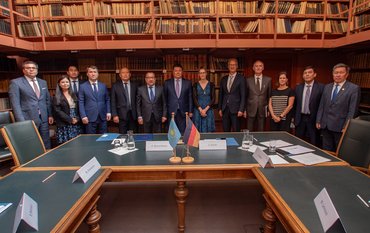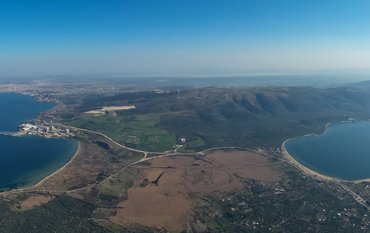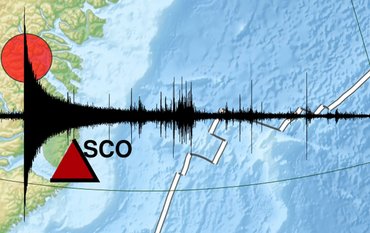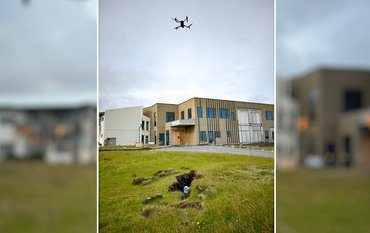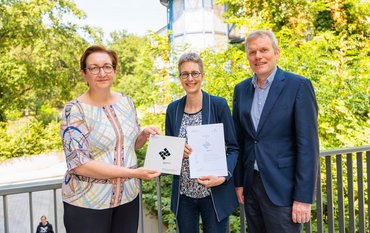Within the framework of the EU project PROSPECTOMICS, five international partners have started to develop environmentally-friendly exploration methods.
Despite the efforts towards energy transition, oil and gas will continue to play an important role in Europe's energy and raw materials supply for at least 30 years. As less and less hydrocarbon is being sought in Europe, there is an increasing dependence on other countries. One of the main reasons for this decline in exploration is the environmental impact of finding new deposits. Novel prospecting methods are therefore needed to minimise the environmental footprint when searching for domestic deposits.
A new and promising approach is based on molecular biology. It is designed to detect changes in sediments above reservoirs where microorganisms are naturally exposed to hydrocarbon seepage. Industrially applicable methods are developed on this basis within PROSPECTOMICS. This EU project is funded for 42 months with 3.4 million euros within the framework of the EU Horizon 2020 programme Future Emerging Technologies (FET). Five research groups from Germany, Luxembourg and Austria, as well as a Norwegian exploration company, are cooperating under the leadership of the German Research Centre for Geosciences Potsdam (GFZ).
Environmentally-friendly search for deposits
Turning away from fossil fuels and converting the economy to renewable energies are central components of the European Union's strategy. But even under the best conditions, oil and gas will continue to contribute to the supply with energy and raw materials for several decades. Hence, in recent years, it became clear that minimising dependence on non-European partners is of great strategic importance.
A more extensive use of domestic reserves is often difficult because of existing environmental regulations or conflicts with other users of the areas, as the search for new oil and gas deposits usually relies on techniques, such as deep drilling, which have a large environmental footprint. "By using molecular biology methods, deep drilling could be at least partially eliminated. This would greatly reduce the negative effects on the environment," says Jens Kallmeyer, head of the project and head of the aquatic geochemistry working group at the GFZ.
An international team with industrial partners
In order to develop new, industrially applicable prospecting methods based on molecular biology, a number of internationally renowned research groups have joined forces in PROSPECTOMICS, each specialised in the analysis of specific biomolecules. They come from the German Research Centre for Geosciences in Potsdam, the University of Greifswald, the University of Duisburg-Essen, the Luxembourg Centre for Systems Biomedicine at the University of Luxembourg, the Centre for Microbiology and Environmental Systems Science at the University of Vienna and Lundin Energy, a Norwegian industrial partner.
Changes in microbes as an indication of hidden oil or gas reservoirs
The approach taken in the project is based on the observation that every oil or gas reservoir has minimal leaks to which the microbial communities in the overlying sediment layers react. These reactions can be manifold – switching certain genes on or off, producing specific enzymes to degrade hydrocarbons, accumulating certain metabolic products or a shift in species composition – and are often minimal. PROSPECTOMICS will investigate how they can be detected using state-of-the-art so-called omics methods, such as metagenomics, metatranscriptomics and metaproteomics. Each of these methods focuses on a specific group of biomolecules, each of which contains specific information.
The fact that routine genetic sequencing of environmental samples has seen great progress and a massive drop in price in recent years was an important prerequisite for this project. Other molecular biology methods have also significantly improved and come into price ranges that make the broad scale analysis of many samples possible.
Using artificial intelligence to recognise patterns in data sets
The large amounts of data generated during such analyses constitutes a new major challenge and looking for characteristic patterns will require the use of machine learning and artificial intelligence methods. "Our goal is to develop novel, highly sensitive methods for detecting reservoirs by identifying individual key parameters that are so robust and easy to use that they can be used as a standard technique in oil and gas exploration," says Kallmeyer.
Role of each institution:
GFZ - GeoForschungsZentrum Potsdam
At the German Research Centre for Geosciences in Potsdam, the Organic Geochemistry and Geomicrobiology sections are involved in the project. They are responsible for the project management and - together with Lundin Energy - for the expedition logistics. In addition, the GFZ is responsible for field sampling, preservation and distribution of the sediment samples to the partners. Scientific tasks at the GFZ include characterising the organic matter and clarifying the biogeochemistry of the sampling sites as well as the effect of hydrocarbon leakage on microbial activity.
UDE - University of Duisburg-Essen
At the University of Duisburg-Essen, the Aquatic Microbial Ecology Group is involved in the execution of the project. Their tasks are to investigate the genetic material (DNA) of the microorganisms and viruses in the sediment samples and to identify genes as markers. For this purpose, modern bioinformatics methods are used to put complex data structures into comprehensible contexts. Much of the research in this project (e.g., AI) is based on these analyses, so the group works in close cooperation with all the other partners in PROSPECTOMICS.
University of Greifswald
Scientists from the Institute of Microbiology at the University of Greifswald are involved in this project. They are working closely with colleagues from Luxembourg to develop new methods for parallel genome and proteome analysis in order to then carry out extensive proteome analyses of the sediment samples. The extensive experience in the field of highly complex metaproteome samples is particularly helpful here. The aim of the investigations is to clarify the effects of hydrocarbon leakage on microbial activity.
LCSB - Luxembourg Centre for Systems Biomedicine
The Systems Ecology research group of the Luxembourg Centre for Systems Biomedicine at the University of Luxembourg is working on the integrated analysis of microbiological omics data. The objective is to generate data with the highest quality and lowest variability to enable robust analysis and inference. To this end, new methods for extracting biomolecules from sediment samples from the PROSPECTOMICS project are being developed at the LCSB. The extracts are then handed over to the partners for further analyses. Furthermore, the LCSB is involved in sequencing DNA and RNA, to generate metagenomic and metatranscriptomic data, and supports the partners in data analysis.
For further information, please see the project website: https://www.prospectomics.eu
Scientific Contact:
Dr. Jens Kallmeyer
Section Geomicrobiology
Helmholtz Centre Potsdam
GFZ German Research Centre for Geosciences
Telegrafenberg
14473 Potsdam
Phone: +49 331 288-28785
Email: jens.kallmeyer@gfz-potsdam.de
Media contact:
Dr. Uta Deffke
Public and Media Relations
Helmholtz Centre Potsdam
GFZ German Research Centre for Geosciences
Telegrafenberg
14473 Potsdam
Phone: +49 331 288-1049
Email: uta.deffke@gfz-potsdam.de



![[Translate to English:] [Translate to English:] Abror Gafurov von dem Schriftzug "Welcome to Azerbaijan" und den UN und COP Logos](/fileadmin/_processed_/2/5/csm_2024_11_Baku_COP29_Abror_Gafurov_1042faec82.jpeg)



![[Translate to English:] Martin Herold standing in front of the library on the Telegrafenberg](/fileadmin/_processed_/c/d/csm_Martin_Herold_d385ee4dd9.jpeg)
![[Translate to English:] Many people are listening to a presentation in the GFZ lecture hall.](/fileadmin/_processed_/c/a/csm_1_Bild1_hell_b9c0e9f5ed.jpeg)





![[Translate to English:] Both scientists sitting on stools in front of a wall of books in the Telegrafenberg library](/fileadmin/_processed_/6/6/csm_Buiter_Castell_DORA_4_e87cb1ea18.jpeg)
![[Translate to English:] Gruppenbild mit 4 Personen](/fileadmin/_processed_/8/d/csm_20241017_GFZ-Emmerman-Medal-005_web_reinhardtundsommer_21a414fa4a.jpeg)






![[Translate to English:] Ice landscape with five red tents](/fileadmin/_processed_/8/9/csm_Zeltlager_auf_dem_Eis_Urheberin_Jenine_McCutcheon_5ced2d523b.jpeg)



